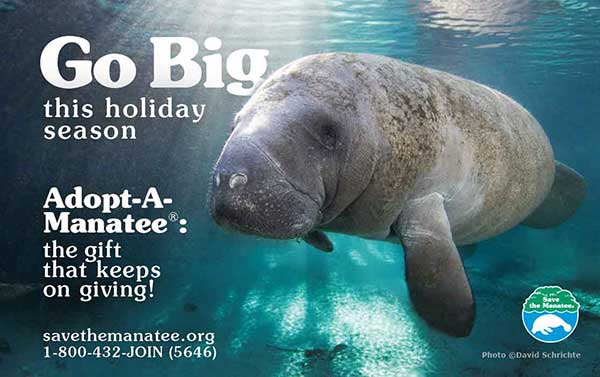By Leslie Lake
Published on December 12, 2022
Read the original article on amisun.com.

Since the 2017 downlisting of manatees from endangered to threatened status – and with a record number of deaths of the marine mammals – a push is underway to seek restoration of the manatee’s endangered status and the protections that go along with it.
Last month, The Center for Biological Diversity, Harvard Animal Law & Policy Clinic, Miami Waterkeeper and Save the Manatee Club petitioned the U.S. Fish and Wildlife Service (FWS) to increase protections for West Indian manatees. The petition urges the wildlife service to reclassify the species from threatened to endangered under the federal Endangered Species Act (ESA).
“Since the service prematurely reduced protections in 2017, the species has declined dramatically,” according to a press release from The Center from Biological Diversity, a national non-profit conservation organization with a Florida office in St. Petersburg. “Pollution-fueled algae blooms sparked an ongoing mortality event that killed more than 1,110 Florida manatees in 2021 alone. This represents 19% of the Atlantic population and 13% of all manatees in Florida.”
As of October, 726 manatees have died in Florida so far this year. Officials estimate about 6,500 manatees live in waters of the southeastern U.S.
“West Indian manatees from Florida to the Caribbean are facing drastic threats from habitat loss, boat strikes, pollution, climate change and toxic algae blooms,” said Ben Rankin, a student attorney at the Harvard Animal Law & Policy Clinic. “The restoration of full Endangered Species Act protections is an essential first step in conserving this species everywhere it is found.”
Manatees had been protected as “endangered” since 1967 under the ESA. The 2017 reclassification came after the Pacific Legal Foundation, on behalf of Save Crystal River Inc., a recreational boating group, petitioned the FWS, saying the safety measures addressing the manatee’s endangered level of protection were bad for tourism and boating businesses.
Manatees are protected by the Florida Manatee Sanctuary Act, the federal Marine Mammal Protection Act and the ESA. They are listed as threatened under the ESA and designated as depleted under the Marine Mammal Protection Act.
It is illegal to feed, harass, harm, pursue, hunt, shoot, wound or kill manatees.
The West Indian manatee consists of two sub-species: the Florida manatee and the Antillean manatee. The average Florida manatee is about 10 feet long and weighs about 1,200 pounds. Florida manatees can live more than 65 years, however, among the manatees that reach adulthood, only about half are expected to survive into their early 20s, according to the Florida Fish and Wildlife Conservation Commission (FWC).
The pending petition is not the first call to restore the manatee’s endangered status. In June 2021, U.S. Rep. Vern Buchanan (R-Manatee) called on the FWS to upgrade the manatee from threatened to endangered under the ESA.
“Manatees are beloved, iconic mammals in Florida,” Buchanan said. “We should provide these gentle giants with the highest levels of federal protection.”
In Nov. 2021, the FWC and the FWS ad- dressed an unusual mortality event (UME) among manatees along Florida’s Atlantic coast.
“Researchers have attributed the UME to starvation due to the lack of forage in the Indian River Lagoon. Historically, the lagoon has provided essential habitat to manatees year-round, and during the colder winter months many manatees depend on warm water refuges in this area,” according to the FWC.
“Increasing protections for manatees with an endangered listing would provide immediate protection,” said Rachel Silverstein, executive director of Miami Waterkeeper. “With astounding losses of seagrasses around the state, we need to address water-quality issues to give the manatee a fighting chance to survive and thrive.”
FWS has 90 days to evaluate whether the petition to protect the manatee as endangered presents substantial information to indicate that the action may be warranted. If so, the agency must complete a thorough review of the species’ status within 12 months of receiving the petition.





